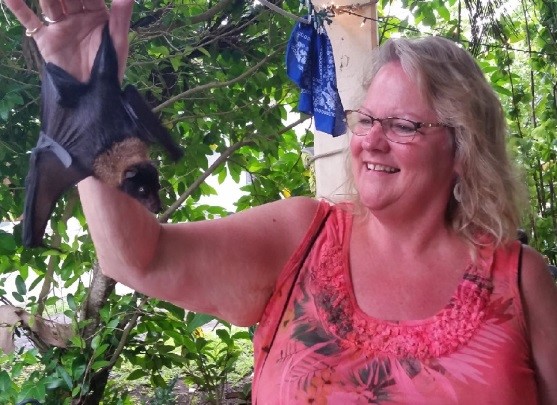Cynthia "Cindy" Uptegraft Barry
Cindy Barry retired on March 31, 2018, after 41 years of federal service. Her career with the U.S. Fish and Wildlife Service included positions in the Pacific Region 1, Northeast Region 5, and Headquarters, in the programs of Refuges, Ecological Services, External Affairs, and Budget/Administration. At the time of her retirement, Ms. Barry served as the Deputy Assistant Regional Director for Ecological Services in the Pacific Region (Washington, Oregon, Idaho, Hawaii, and the Trust Territories of the Pacific Islands). She supervised approximately 35 staff in the Regional Office in Portland, Oregon, providing management leadership in the fields of renewable energy programs, partnerships for habitat restoration, and implementation of the Endangered Species Act. In addition, she provided administrative (budget and personnel) support for the 300+ Ecological Services staff in the Pacific Region.
Background
The Bicentennial Land Heritage Program provided many job openings, and in 1977, Cindy became the first Outdoor Recreation Planner at the John Heinz National Wildlife Refuge at Tinicum, near Philadelphia, Pennsylvania. She completed Basic Refuge Management Training at Beckley, WV, (1979) and Federal Law Enforcement Training, Glynco, GA, (1981). In 1983, she moved to the Service’s Northeast Regional Office in the Refuge Operations program, and then to Washington, D.C., where she worked for the Service’s Division of Budget. Cindy was selected for the Departmental Manager Development Program (1988), which included a nine-month Congressional internship with the House Interior Appropriations Committee.
Cindy joined the Public Affairs staff in the Pacific Regional Office (1989), and was thrust into the world of press conferences and public hearings for the listing of the northern spotted owl and designation of critical habitat. She assisted the staff of attorneys defending the Service’s jeopardy biological opinions on BLM’s 44 timber sales, resulting in a decision by the Endangered Species Committee (“God Squad”). After supervising the Division of Recovery (recovery planning, section 7 consultations, and section 10 habitat conservation planning), Ms. Barry served as Manager of the Endangered Species program in the Pacific Region (including California and Nevada) from 1993-1997. She served a dual role as the Deputy Assistant Regional Director (ARD) for Ecological Services and as acting Geographic ARD for the Klamath/Central Pacific Coast Ecoregion from 1997-1998. From 1998-2003, Cindy was the Ecological Service's Program ARD, and then she found her niche as the Deputy ARD for Ecological Services, from 2003 until she retired on March 31, 2018.
Education
Ms. Barry earned her Bachelor’s of Science Degree in Applied Life Studies in 1976 from the University of Illinois at Champaign/Urbana. During college, Ms. Barry was a Work Leader with the Youth Conservation Corps at the resident camp on Crab Orchard National Wildlife Refuge, IL, and a student trainee with the National Park Service at the Gateway Arch in St. Louis, MO, in the Cooperative Education Program.
Postscript
Cindy is a second-generation Service employee; she lived on several national wildlife refuges in the Northeast and Midwest Regions from 1959-1972, as the daughter of retiree (now deceased) Darrell “Dick” Uptegraft. Cindy resides on the shores of the Columbia River in Vancouver, WA. Her two sons, Creighton and Kyle, graduated from the University of Washington, Seattle.
Photo
Cindy Barry with a juvenile Tongan fruit bat, 03/18/2015, Pago Pago, American Samoa.
